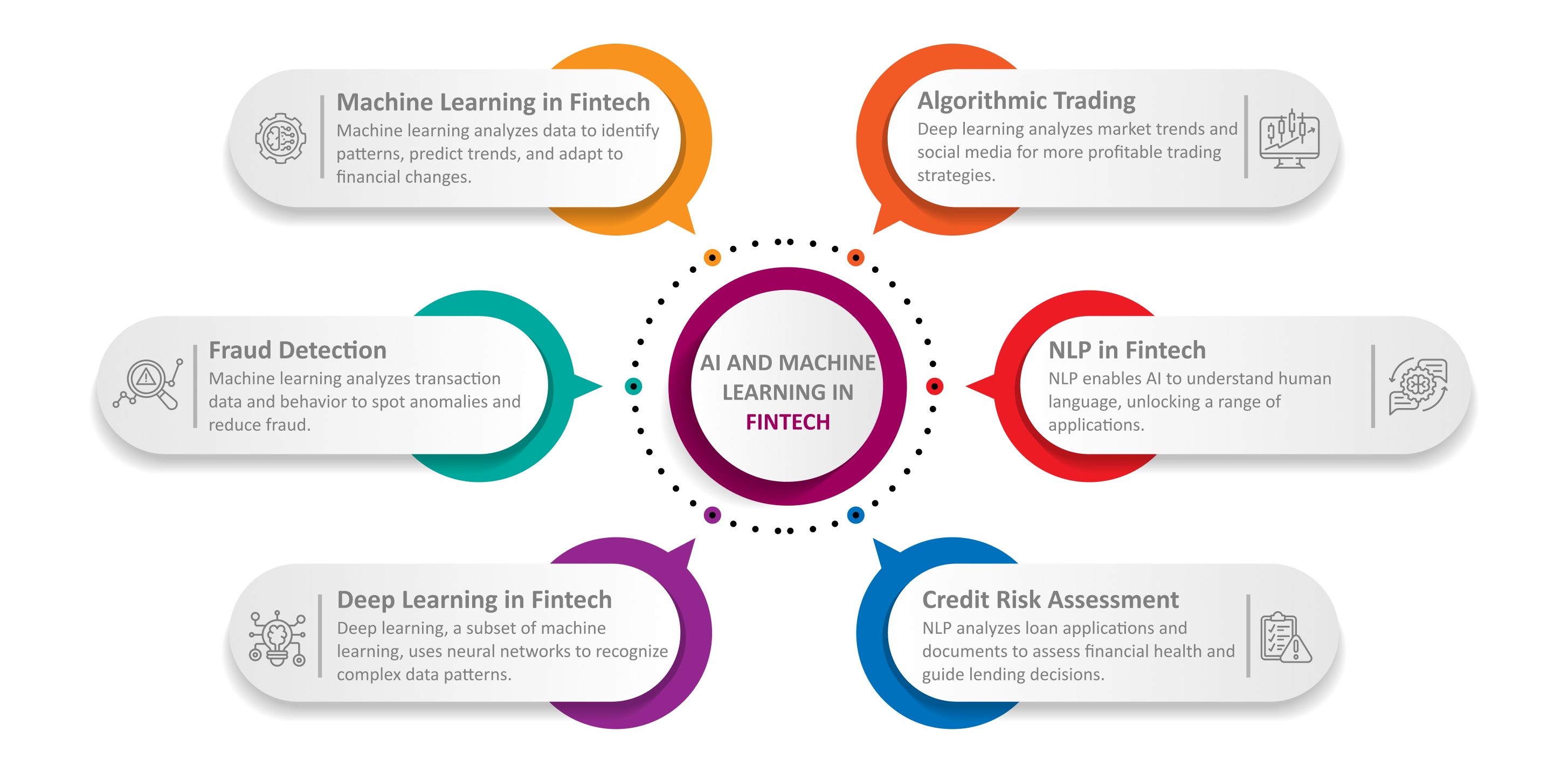
❅
❅
❅
❅
❅
❅
❅
❅
❅
❅
❅
❅
❅
❅
❅
❅
❅
❅
❅
❅
❅
❅
❅
❅
❅
❅
❅
❅
❅
❅
❅
❅
❅
❅
❅
❅
❅
❅
❅
❅
❅
❅
❅
❅
❅
❅
❅
❅
❅
❅
❅
❅
❅
❅
❅
❅
❅
❅
❅
❅
❅
❅
❅
❅
❅
❅
❅
❅
❅
❅
❅
❅
❅
❅
❅
❅
❅
❅
❅
❅
❅
❅
❅
❅
❅
❅
❅
❅
❅
❅
❅
❅
❅
❅
❅
❅
❅
❅
❅
❅
❅
❅
❅
❅
❅
❅
❅
❅
❅
❅
❅
❅
❅
❅
❅
❅
❅
❅
❅
❅
❅
❅
❅
❅
❅
❅
❅
❅
❅
❅
❅
❅
❅
❅
❅
❅
❅
❅
❅
❅
❅
❅
❅
❅
❅
❅
❅
❅
❅
❅
❅
❅
❅
❅
❅
❅
❅
❅
❅
❅
❅
❅
❅
❅
❅
❅
❅
❅
❅
❅
❅
❅
❅
❅
❅
❅
❅
❅
❅
❅
❅
❅
❅
❅
❅
❅
❅
❅
❅
❅
❅
❅
❅
❅
❅
❅
❅
❅
❅
❅
The financial industry is rapidly evolving with automation and Artificial Intelligence (AI) at its forefront. Fintech, integrating finance and technology, utilizes AI in Fintech to streamline operations and enhance customer experiences. This includes mobile payments, blockchain applications, and more, driven by AI's machine learning and data analysis.
Traditional automation excels at routine tasks but faces challenges with complex data and adapting to change, limiting personalized and predictive finance. AI in Fintech bridges these gaps by enabling intelligent automation, offering real-time financial advice through AI-powered chatbots and detecting fraud with high accuracy. AI is set to revolutionize Fintech, enhancing efficiency, security, and personalized services.
This blog explores AI's transformative impact on Fintech, overcoming limitations to enhance efficiency, security, and personalized finance.
Challenges of Traditional Automation in Fintech
Traditional automation has boosted efficiency in Fintech by automating routine tasks. However, it struggles with today's dynamic demands:
Handling Complex Data: Traditional systems excel with structured data but struggle with complex sources like social media and customer feedback, limiting comprehensive insights.
Lack of Flexibility: Rule-based automation is inflexible, requiring manual changes for unexpected situations or regulatory shifts, slowing response times.
Processing Unstructured Data: Financial data often exists in unstructured formats like emails and social media. Traditional automation finds it difficult to extract meaningful insights, hindering decision-making.
These limitations impact Fintech operations, causing slower loan processing, less personalized customer experiences, and challenges in detecting fraud. Adapting is crucial for Fintech to innovate and compete effectively.
AI: The Disruptive Force Redefining Fintech Automation
Traditional automation's limitations make way for Artificial Intelligence (AI) to transform Fintech. AI in Fintech excels with machine learning, deep learning, and natural language processing (NLP), overcoming the obstacles traditional automation faces.
These examples show how AI-powered Fintech solutions and fintech AI applications are transforming fintech automation, creating a more efficient, secure, and personalized future.
AI-Powered Automation: Expanding Fintech Horizons
Integrating AI with automation unlocks new possibilities for Fintech. Here's how AI in Fintech enhances automation across key areas:
Enhanced Customer Experience (CX)
NLP Chatbots in Fintech: AI-powered chatbots provide 24/7 customer support, understanding queries, and offering personalized assistance, which improves satisfaction and frees up human agents for complex tasks.
Personalized Financial Recommendations in Fintech: AI analyzes customer behavior and market trends to offer personalized financial advice, helping customers make informed decisions and building trust.
Streamlined Operations
Automating Back-Office Tasks in Fintech: AI automates repetitive tasks like loan processing and account verification, improving efficiency and allowing staff to focus on higher-value activities.
AI Data Analysis in Fintech: AI systems analyze large datasets quickly and accurately, providing insights to optimize processes, identify trends, and support data-driven decisions.
Risk Management and Security
AI-powered Fraud Detection in Fintech: AI identifies anomalies and suspicious patterns in real-time transaction data, reducing financial losses and protecting customer information.
Machine Learning in Fintech Security: Machine learning algorithms analyze network traffic and user behavior to detect and mitigate security threats, safeguarding financial data.
By leveraging AI-powered Fintech solutions, institutions can automate tasks, gain deeper insights, personalize experiences, and build a more secure financial ecosystem for the future.
The Evolving Landscape of AI in Fintech Automation
The future of AI-powered Fintech automation is promising. As AI advances, its integration with Fintech will become seamless and sophisticated. Here's a look ahead:
Explainable AI (XAI) in Fintech: Explainable AI (XAI) will help us understand AI decisions, fostering trust and responsible implementation.
AI and Blockchain Integration in Fintech: AI can analyze blockchain data to identify trends, optimize transactions, and enhance security, revolutionizing identity management and payments.
Hyper-Personalization with AI in Fintech: AI will tailor financial products to individual needs in real-time, creating personalized financial recommendations from investments to insurance plans.
The future of AI in finance, particularly in fintech automation, is about creating dynamic, personalized financial experiences. As AI evolves, fintech will lead in shaping an intelligent, secure, and accessible financial future.
End Note
Traditional automation's limitations in Fintech pave the way for AI's transformative potential. By integrating AI in Fintech, the industry enters an era of intelligent, adaptive, and personalized automation.
AI-powered Fintech solutions enhance fintech by:
- Learning and Adapting: Machine learning continuously identifies patterns and adapts to changes, surpassing traditional rigidity.
- Unlocking Complex Data: AI processes unstructured data, extracting insights for better decision-making through AI data analysis in Fintech.
- Enhancing Customer Experience (CX) in Fintech: AI personalizes financial services with real-time recommendations and 24/7 NLP chatbot support, including personalized financial recommendations.
- Boosting Security: AI-powered fraud detection in fintech protects institutions and customer data.
The future of AI-powered fintech automation holds immense promise, from explainable AI building trust to hyper-personalized financial services.

Krunal Bhimani
Business Development Executive








